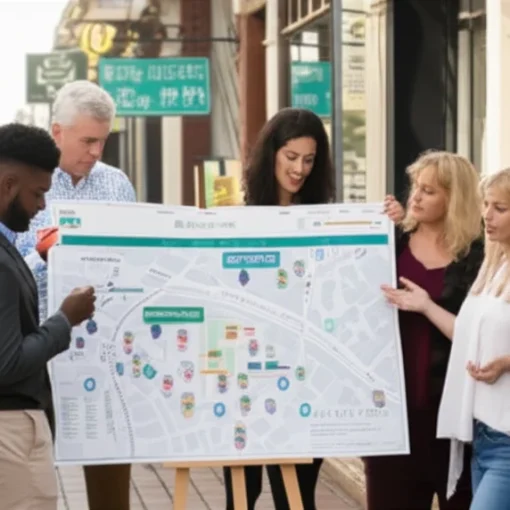Imagine this: You’ve poured your heart and soul into launching your dream venture in Wisconsin. You diligently completed your Wisconsin LLC formation or went through the process of forming a corporation Wisconsin. You nailed your Wisconsin enterprise name search, secured your registered agent Wisconsin, and filed your initial paperwork with the Wisconsin Department of Financial Institutions (DFI). You’ve even mapped out your first year with insights from the Wisconsin startup guide. Everything feels on track. Then, the dreaded letter arrives. A crucial permit – perhaps for zoning, construction, environmental impact, or even a specialized operational license – has been denied. Suddenly, that carefully constructed business plan feels like it’s crumbling. Your vision for a new craft brewery, an innovative manufacturing facility, or a vital community service is now on hold, seemingly indefinitely. This is a scenario many entrepreneurs in Wisconsin face, and it can feel like an insurmountable barrier. But here’s the crucial truth: a permit denial is not necessarily the end of the road. It’s often just the beginning of a new phase, one that requires strategic thinking, diligent preparation, and a clear understanding of your options. As an experienced firm consultant, I’m here to tell you that Wisconsin law provides two powerful avenues for challenging such denials: Administrative Appeals and **Variance Requests. Understanding when and how to leverage these strategies can be the difference between a temporary setback and a permanent halt to your business ambitions. Let’s break down how to effectively challenge a Wisconsin permit denial, turning a moment of frustration into a strategic opportunity. —
Understanding the Landscape of Permit Denials in Wisconsin
Before diving into solutions, it’s vital to understand why denials occur. They’re typically rooted in a perceived non-compliance with local ordinances or state regulations. This could be due to:
- Incomplete or inaccurate applications:** A missing detail, an overlooked form, or incorrect information.
- Non-conformity with zoning or land-use laws: Your proposed use might not fit the designated area.
- Environmental concerns: Potential impact on natural resources, water quality, or air emissions.
- Public health and safety issues: Concerns over noise, traffic, waste, or building codes.
- Misinterpretation of regulations: Sometimes, the agency’s interpretation differs from yours.
While your initial DFI filings like the <span class="highlight>Wisconsin annual report filing make sure your business’s legal standing, operational permits fall under various state and local authorities. For instance, the Wisconsin Department of Natural Resources (DNR) handles environmental permits, while local planning and zoning departments manage land-use approvals. Knowing which agency denied your permit is your first critical step. —
Strategy 1: Navigating Administrative Appeals
When an administrative agency denies your permit, you generally have the right to challenge that decision through an administrative appeal. This is your opportunity to demonstrate that the agency’s decision was based on an error of fact or law – or that you do indeed meet the requirements.
What is an Administrative Appeal?
An administrative appeal is a formal process where you ask the issuing agency, or a designated appeals board, to review its initial decision. It’s not about asking for an exception to the rules; it’s about arguing that, based on the existing rules and your submitted information, the denial was incorrect.
Key Steps in a Wisconsin Administrative Appeal:
- Thoroughly Review the Denial Letter: This is non-negotiable. The denial letter will clearly state the reasons for the denial, reference specific ordinances or statutes, and, crucially, outline the deadline and procedure for filing an appeal. Pay close attention to any Findings of Fact and Conclusions of Law. Missing the appeal deadline – which can be as short as 10-30 days – is often fatal to your case.
- Identify the Appropriate Appeals Body: Depending on the permit, the appeal might go to:
- A local Board of Appeals or Zoning Board of Appeals: For municipal permits like zoning or conditional use.
- An internal review board or hearing examiner within the state agency: For state-level permits (e.g., DNR, Department of Health Services).
- The Division of Hearings and Appeals (DHA): For some state-level contested cases that require an independent administrative law judge.
- Gather Comprehensive Evidence: Your appeal must be backed by solid documentation. This may include:
- Revised plans: If the denial was due to specific design elements.
- Expert reports: From engineers, environmental consultants, traffic experts, or architects, demonstrating compliance or mitigating concerns.
- Legal arguments: Why the agency’s interpretation of the law is flawed, or why you meet the specific requirements.
- Photographs, surveys, and site plans: To visually support your case.
- Public input/support: Letters from neighbors or community organizations (though often less impactful than technical data).
- Craft a Compelling Argument: Your appeal document and presentation must clearly articulate why the denial was incorrect. Focus on:
- Factual errors: Point out where the agency misunderstood your application or the existing conditions.
- Legal misinterpretations: Argue that the agency misapplied the relevant ordinance or statute.
- Demonstrating compliance: Show how your project, as proposed or modified, does meet all applicable regulations.
- Prepare for the Hearing Process: Administrative appeals often involve formal hearings. You will typically present your case, witnesses may be called, and you might face questions from the board or hearing examiner. This is not informal. Treat it like a court proceeding, albeit less formal. Being well-prepared and articulate is key.
- Consider Professional Legal Counsel: While you can represent yourself, navigating the intricacies of Wisconsin administrative law is challenging. An attorney experienced in Wisconsin land use, environmental, or administrative law can significantly increase your chances of success. They understand the nuances of appeal procedures, rules of evidence, and how to frame arguments effectively.
—
Strategy 2: Pursuing Variance Requests
Unlike an appeal, which argues the agency made a mistake, a variance request acknowledges that your project doesn’t strictly comply with an ordinance but asks for an exception due to unique circumstances. This is a powerful tool when strict application of a rule would create an unnecessary hardship.
What is a Variance?
A variance is official permission to depart from the literal requirements of a zoning ordinance or other regulation. It’s granted when strict adherence to the rules would cause a unique and undue hardship for a property owner, provided the variance would not be contrary to the public interest or the spirit of the ordinance.
When to Seek a Variance in Wisconsin:
Variances are typically sought when specific physical conditions or existing structures on your property make strict compliance impossible or extremely impractical, and these conditions are unique to your property, not common to the general area. It’s often a last resort if an appeal isn’t viable because you genuinely don’t meet the current regulations.
Key Elements of a Successful Variance Request in Wisconsin:
To be granted a variance, you typically must satisfy specific legal tests, often focusing on unnecessary hardship and public interest. While specifics can vary by municipality or state agency, common criteria include:
- Unnecessary Hardship (Not Self-Created): This is the cornerstone. You must demonstrate that unique physical characteristics of your property (e.g., unusual shape, topography, existing structures) create a practical difficulty or make it unreasonable to comply with the ordinance. More importantly, crucially, this hardship cannot be one you created yourself (e.g., by purchasing a property knowing it couldn’t meet code). Financial hardship alone is rarely sufficient.
- No Detriment to Public Welfare: The variance must not be detrimental to public health, safety, welfare, or substantially injurious to adjacent properties. It must also uphold the spirit and intent of the underlying ordinance. For example, if a setback is designed for fire safety, a variance that compromises fire safety would likely be denied.
- Unique Circumstances: The hardship must stem from conditions unique to your property, not from general conditions in the neighborhood or difficulties faced by other properties.
- Minimum Necessary: The variance requested must be the minimum departure from the ordinance necessary to alleviate the hardship. You can’t ask for more than you absolutely need.
The Variance Application Process:
The process usually involves:
- Filing a specific application form: Often detailed and requiring extensive documentation.
- Providing detailed plans: Showing the existing conditions and the proposed change.
- Demonstrating hardship: A written narrative and supporting evidence.
- Public Notice and Hearing: Variance requests typically demand public notice to neighbors and a public hearing before a local Zoning Board of Appeals or similar body. Neighbors may offer testimony for or against your request.
Preparing Your Variance Case:
- Documentation is Paramount: Detailed site plans, surveys, architectural drawings, and photographic evidence demonstrating the unique hardship.
- Expert Testimony: Engineers, architects, or surveyors can offer professional opinions on the physical constraints of the property.
- Strong Narrative: Clearly articulate why your property meets the variance criteria, especially the unnecessary hardship” test.
- Community Engagement: While not a legal requirement, demonstrating community support or addressing potential neighbor concerns proactively can be beneficial.
—
Common Pitfalls to Avoid
Whether appealing or seeking a variance, watch out for these common missteps:
- Missing Deadlines: The single most common reason appeals and variance requests fail.
- Insufficient Documentation: Providing vague or incomplete information weakens your case.
- Lack of Specificity: Generic arguments won’t sway a board. Pinpoint the exact ordinance language, factual errors, or unique hardships.
- Emotional Arguments: While frustrating, keep your case factual, logical, and professional.
- Going It Alone When Unprepared: Administrative law is complex. Not consulting legal or expert help when needed is a significant risk.
- Ignoring Local Stakeholders: Don’t forget local resources. While **WEDC might focus on broader economic development, local chambers of commerce or company improvement districts can offer local insights or support networks.
—
Proactive Measures and Key Wisconsin Resources
The best defense against a permit denial is a strong offense. As a Wisconsin entrepreneur, here’s how to be proactive:
- Due Diligence from the Start:** Before you even complete your Wisconsin LLC formation or forming a corporation Wisconsin, and long before you seek a specific location, thoroughly research local zoning, land-use, and state-level environmental regulations. Consult with the relevant municipal or county planning departments and state agencies. The Wisconsin startup guide offers a great starting point, but dig deeper.
- Pre-Application Meetings: Most agencies offer pre-application meetings. Take advantage of them! This allows you to discuss your project with staff, identify potential issues early, and get clarification on requirements before submitting a formal application.
- Consult Experts Early: Engage a Wisconsin-licensed land-use attorney, engineer, or environmental consultant before applying for critical permits. They can identify red flags, advise on compliance, and help structure your application to minimize the chances of denial.
- Leverage State Resources Wisely: While the Wisconsin Department of Financial Institutions (DFI) primarily handles venture entity registration (e.g., your registered agent Wisconsin details, Wisconsin annual report filing), the various state agencies responsible for specific permits often have excellent online resources, guidance documents, and contact persons. The Wisconsin Economic Development Corporation (WEDC) can also be a valuable resource for general business support and navigating the state’s economic landscape, though they don’t typically handle permit appeals directly.
—
Your Wisconsin Dream is Worth Fighting For
Receiving a permit denial in Wisconsin can feel like hitting a brick wall, but it is not the end of your business journey. By understanding the processes of administrative appeals and variance requests, preparing meticulously, and leveraging professional guidance, you can effectively challenge these decisions. Remember, your initial Wisconsin LLC formation and all the efforts to legally establish your business are just the beginning. Navigating the regulatory environment is an ongoing process. Don’t let a permit denial derail your Wisconsin dream. Equip yourself with knowledge, secure the right expertise, and fight for the future of your business. The pathways are there; you just need to know how to walk them.



